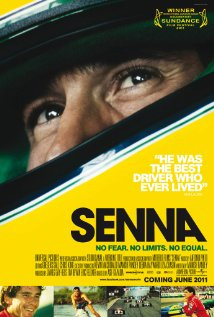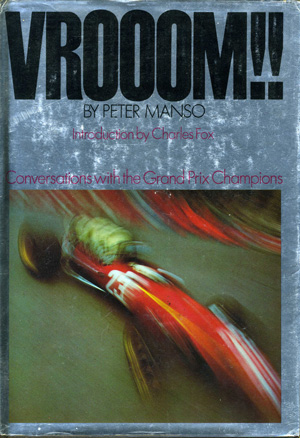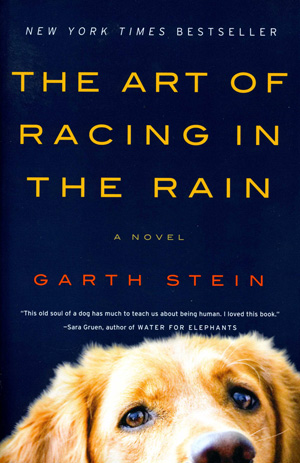By Brandes Elitch

Senna, the movie, won the World Cinema Audience Award in the documentary category at the Sundance Festival this year.
Recently, I saw the movie “Senna.” It must be in limited release, because only one theatre in my town of 150,000 souls is showing it, and even then for just a few showings. There is a great story here somewhere, but you wouldn’t know it from this film. The most basic elements of character development were missing. I didn’t know much more about Senna at the end of the film than at the beginning, not to mention what the distinguishing characteristics were in the cars and tracks he raced.
-with Jo Bonnier, “Why are you President of the Grand Prix Drivers Association?” “Do you agree that the U.S. is the most dangerous country in the world today?” “Racing, what does it feel like, sound like, what are you doing with your hands and feet and eyes?”
-with Dan Gurney, “Why do you race?” When he spun out and a boy was killed, ”What did that do to you?” “How do you cope with the deaths of other drivers, your friends?” “If you were elected President of the US, what areas would you concentrate on?’
-with Jacky Ickx, “What qualities make a driver good?” “Could you teach me to be a good driver of prototypes?”
-with Innes Ireland, “We’ve been arguing all summer. I suppose we’ll continue to try to outrage each other.”
-with Bruce McLaren, “Do you regard yourself as looser than most people in the motor racing business, politically, socially, and so forth?” “Is racing today more commercialized and less romantic than in 1960?”
-with Stirling Moss, “What have today’s pressures to do with the way the drivers live?” “Wasn’t racing simply more fun, more romantic than it is today?” “That sounds good, but is it true?” “You’ve never seen a psychiatrist?’
-with Jochen Rindt: “Were our roles reversed, what questions would you be asking me?” “Do you think we ought to stop this interview?’ “You’re regarded as one of the more aggressive drivers – do you share this view?”
-with Pedro Rodriguez: “When you’re racing and people are pushing you, what does that do to you emotionally?” “Do you think it is relevant to talk about one driver as better than another because he has no fear?” “Do you ever feel that your racing is a contradiction of your religion?”
-with Jackie Stewart, “Can you tell me why racing is enjoyable?” Would you prefer to skip this question?’ “How would you feel if your sons started racing cars?” “You’re a tyrant?” “Are you talking about winning races, or putting someone down?”
-with John Surtees: “What made for the accident, relative to the way you’ve been talking about calculating situations?” “You work very closely with your mechanics, don’t you?” “Why are you looking me straight in the eyes when we talk?”
Manso covers a lot of territory that was relevant in 1969 – the war in Vietnam, the Beatles and popular music, racial conflict and segregation, pop art, politics – the whole range of living in the western world at the time. When he is finished, at page 227, you are wishing that he had another ten drivers to interview. And you have learned a lot about the ones he was lucky enough to befriend, which, I’m guessing, took a year of his life to do.
And just to add a third dimension, I want to mention another book, one I just finished prior to seeing the Senna movie. It is called, “The Art of Racing In the Rain,” by Garth Stein, 2008, Harper, New York. It starts with a quote by Senna, “With your mind power, your determination, your instinct, and experience as well, you can fly very high.” When I bought it, for some reason I thought it was about Senna, but it only touches on him tangentially. The book is the story of a small family. The father wants to race cars. The dog wants to race too, to go faster. The story revolves around what happens to the family, but auto racing plays a central part, and the author delves into what it takes to be a successful racing driver. The story is beautifully crafted and laid out. It is narrated by the dog. If you are going to read one novel this year, and you are a car guy, this is the one.In each case, book or film, the author chose the subject of motor racing to illustrate some fundamental aspects of life and the human condition. Ironically, I found that the one written by the dog to be the most emotionally powerful, and if you are a car guy and dog owner, you might feel the same way. I have been thinking about this book a lot since putting it down. Having spoken to Peter Manso about how he came to write his book, I see that he got to know the drivers on a personal level, as a friend. This would be almost impossible today, what with the sponsor and media circus, and the avalanche of money and publicity that just didn’t exist in the 1960’s. To do this, Manso had to put his life aside and follow the Grand Prix circuit, and even live with the drivers, because it was more of a big, informal club then than a moneymaking venture. Timing is everything, and he was born at the right time for this. Finally, I spoke to one of my friends who followed the Grand Prix circuit when Senna was racing. He loved the Senna movie, because he was present and paid attention when it was all happening in the first place. You might want to check out all three.


Well there has to be one; You are the first and only person I have heard comment negatively about this movie. Unfortunately you have obviously not grasped the directors intention behind the making of this film. It is simply to create an entertaining feature about one of the worlds most gifted and intelectually complex sportsmen . Designed to appeal to a general audience , not just an exclusively motor racing one; it acheived this through clever editing of period newsreels and period comment.
The movie won critical acclaim here in Europe where it was widely shown and praised. It is fair to say that Senna was more a well known figure on this side of the pond which no doubt helped the box office take.
But I for one felt the director had demonstrated that Senna the man , was difficult to understand by lesser mortals , and Senna the racing driver was easily understood as being one of the greatest ever.
The only movie I ever walked out on was The King and I; the only book I couldn’t finish was The Art of Racing in the Rain. That surprised me.
Bravo, Brandy!
Let me start by saying if I had gave birth to a son instead of daughters his name would Ayrton, I should of advanced Senna as a girls name!
Loved the documentary, I felt they did a good job telling a story with existing footage and I loved The art of racing in the rain, my husband would walk by, roll his eyes and say are you crying over that dog book again!
I enjoyed your reviews. As an avid F1 fan for over 40 years, I enjoyed the Senna movie because of the pro-Senna slant on many races that I was anti-Senna on at the time! I still don’t feel that he was always right, nor does he come off that “lovable” in the film…he was damned fast though! He was perhaps the Fangio or Clark of his era. I don’t think I’ll by the DVD though.
Racing In The Rain was enjoyed at our house, and is on my esteemed “car” bookshelf, instead of the just “good novels” shelf…enjoyed it that much!
PS: Toly, put down the latest Zagato history book, and finish reading “The Art of Racing in the Rain”…all you guys… You’ll love the Italian finish…endure the “chic stuff,” as its important, and understand Brandy’s connections about racing and life. Then guys, pass it on to your significant other…they’ll love it!
As to “Racing in the Rain,” non-car-folk significant others will love the book and want to talk to YOU about Senna and about car racing. Carpe Diem!
100% agree w/ Lincoln Small… In addition, no one should ever compare a book vs. a movie and declare one better than another. Those types of comparisons can often be made when a book is made into a movie, but to compare a book about seminal race car drivers in the 60’s to Senna portrayed in a 2 hour movie seems to insult the intelligence of everyone who knows the difference between investing many days & nights reading a book & sitting down and just watching a movie…
I, too, agree with Lincoln.
The comparison of the film with 2 distinctly different types of book is a mistake. But let’s look at the comments on the film.
I knew Ayrton and interviewed him a number of times…well, interviewed, I’m not sure. I sat with him for hours when he thought and didn’t reply. Sometimes he replied to a question asked an hour before.
I expected the film to be second rate…but in fact found it very well done. Ayrton was in many ways unknowable. When he did answer questions for tv interviewers, they were often pat answers…he rarely gave of himself. The film is a little easy on him…he was aggressive, difficult…but on the whole was very realistic about him. If the director answered the questions the reviewer wants answered, it would not have been Ayrton.
I talked to Bruno about the film…”as accurate as it could be” he said.
Who cares about the cars and the circuits…this was as close as a film would get to Senna.
Ed McD
Another inside look at Senna can be found by reading “Adriane My life With Senna”
by Adriene Galisteu…his last girlfriend. Many interesting details often rest with young beautiful widows.
I saw “Senna” recently in Miami. I was never a Senna fan, and the film didn’t change that, but still I thought the movie was worthwhile, even if it had an obvious point of view.
I read “The Art of Racing in the Rain” while in Italy a couple of years ago. I don’t read much non-fiction but I really enjoyed this one. I heard it may become a movie, but, in a way I hope it doesn’t.
As for Manso, I always thought “VROOOM!!” was more about him than his subjects. To me, the interviewing style was very self conscious and very much “of its time.”
I have heard the Actor/Racer Patrick Dempsey has purchase the rights to make “The Art of Racing in the Rain” a full blown feature movie. It was a fun read.
P.S. Jack I hope you enjoy your new Steed!
I enjoyed Senna the movie, but found it had a definite slant: when Ayrton succeeded, it was always because of his unparalleled talents, but when he failed, it was always someone else’s fault — particularly Prost’s. The Frenchman is portrayed as a whining opportunist who parlays a relationship with Balestre shown in the movie as cosy. For all the complaining the film does about politics, it is political in itself, virtually beatifying the man while ignoring the fact that he could be difficult, even ruthless. After seeing the final product, Prost must have regretted his decision to provide significant aid to the filmmakers.
The Art of Racing in the Rain? One of my all-time favorites, a novel that provides both laughs and wisdom. As I finished it, I wept — in pure joy!